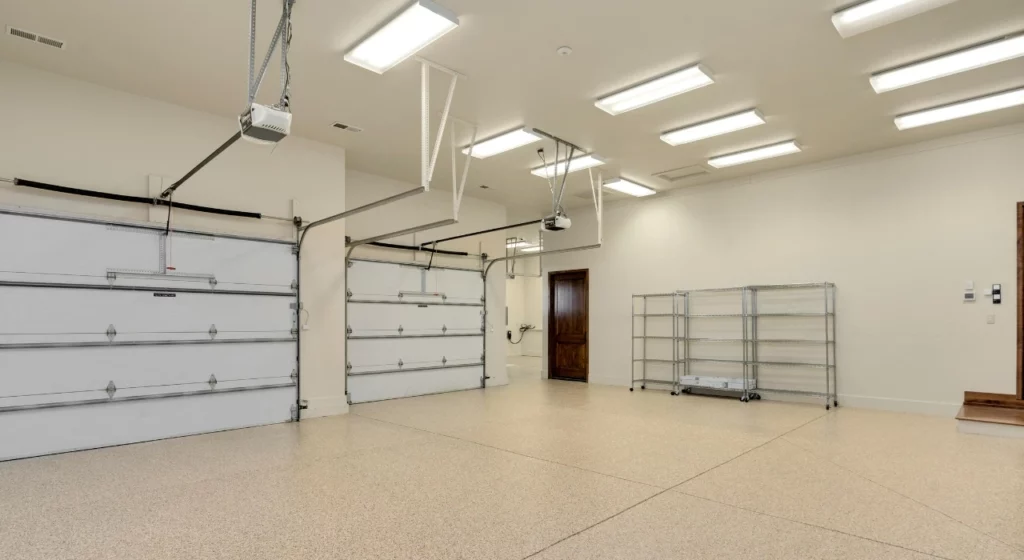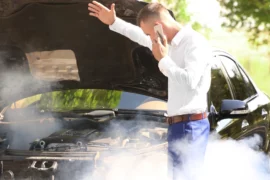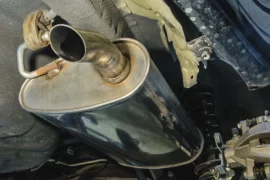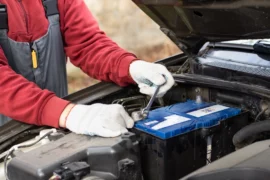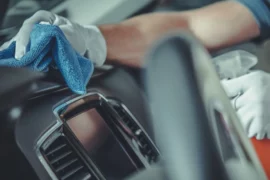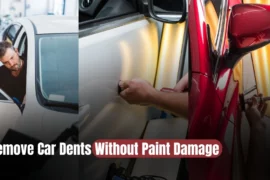Epoxy is one of the first options when you consider having a long-term, attractive, and low-maintenance flooring alternative in your garage. It is resistant to oil and chemical stains and has a smooth and upscale finish, and can withstand intense use. The first question that comes to mind for homeowners when deciding on this renovation is, how much does it cost to epoxy 2 car garage?
In this blog, we are going to explore the cost of epoxy flooring, the cost factors, advantages of epoxy flooring, disadvantages of epoxy flooring, and whether a do-it-yourself or a professional one suits you best.
What Is an Epoxy Garage Floor?
Epoxy flooring is a type of floor finishing, composed of resin and hardener, which creates a hard, glossy surface that is not prone to stains, shock, and dampness if installed on a concrete slab. Its ability to handle heavy vehicles, tools, and chemicals yet appear smooth, is a major reason that it is a favorite in garages.
Average Cost to Epoxy a 2-Car Garage
A standard 2-car garage is approximately 400 to 500 square feet, depending on the design and space afforded by the storage. The estimate of the cost of epoxying a 2-car garage professionally is between 1200 to 3000 dollars; DIY kits are between 250 and 700 dollars.
Here’s a quick overview:
| Service Type | Cost Estimate |
| DIY Epoxy Kit | $250 – $700 |
| Professional Basic Epoxy | $1,200 – $2,000 |
| Professional Decorative Epoxy(flakes,colors) | $1,500 – $2,800 |
| Premium Metallic Epoxy | $2,500 – $3,500 |
Prices can vary depending on the brand of materials utilized, the kind of epoxy, the condition of your existing floor, and your local labor costs.
Factors That Affect the Cost
Several key factors influence the total cost of applying epoxy to a 2-car garage. Understanding these factors can help you plan your budget more accurately and avoid unexpected expenses. Below are some of the factors affecting the cost of an epoxy 2-car garage:
1. Garage’s Scale
The more epoxy and prep work needed depends on the surface area. Larger or strangely formed garages may raise prices, but most 2-car garages are around 400–500 sq. ft.
2. State of the Concrete
More labor will be required if your garage floor is cracked, stained, or uneven. The total cost may rise from $1 to $3 per square foot, depending on grinding, patching, or sealing repairs.
3. Type of Epoxy
Although less durable, water-based epoxy is less expensive. Though more expensive, 100% solid epoxy provides top protection and lasts longer. Custom designs and more labor time on metallic or ornamental epoxy raise the overall cost.
4. Quantity of Coats
Two layers, a primer and a topcoat, are normally needed for most epoxy projects. Including a decorative flake or antislip finish, some high-end treatments may comprise three or four layers.
5. Professional against DIY
Though at a greater price, hiring a professional guarantees a longer-lasting, perfect finish. Though it’s inexpensive, a DIY kit has hazards, including bubbling, early peeling, or uneven coatings if not applied properly.
6. Geographical Situation
Regional labor and materials costs might vary. In urban areas or locations with a great demand for epoxy services, a premium could be asked.
Suggestion: Turn Your R34 Into A Supercar With These Epic Engine Swaps.
Professional Epoxy Floor versus DIY
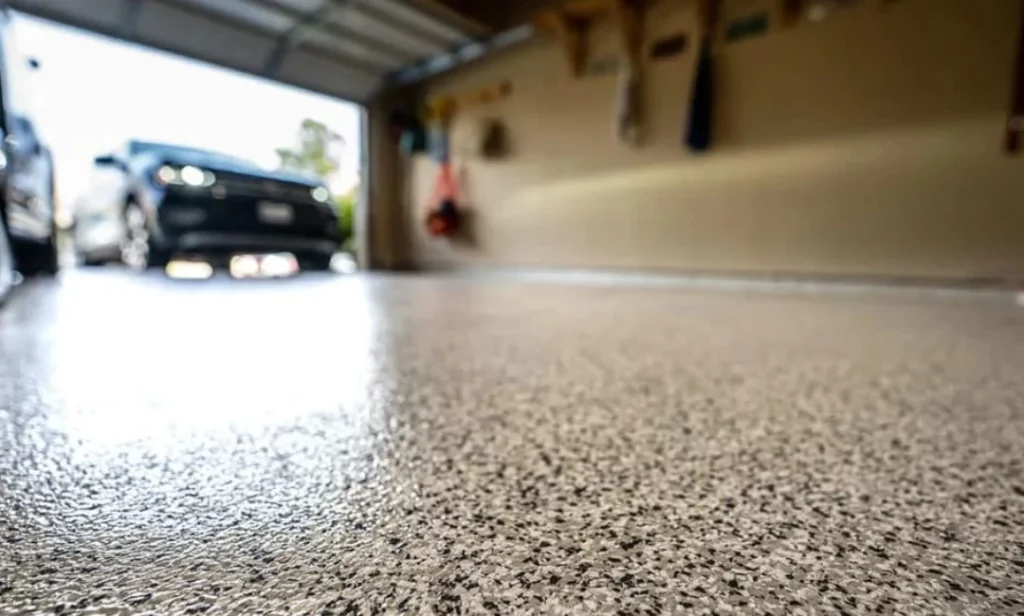
Choosing between a professional epoxy floor installation and a DIY approach depends on your budget, time, and desired finish quality. Each option offers distinct advantages and challenges worth considering before you commit. Let’s compare the professional epoxy flooring with that of DIY:
Do-it-yourself epoxy flooring
Pros:
- Less preliminary expense
- Satisfying for hands-on homeowners
- Perfect for light use or small garages
Cons:
- Time-consuming (could take days)
- Requires tools like grinders and rollers
- Possibility of peeling, bubbles, or incorrect adhesion
- Not as long-lasting as professional finishes
Professional Epoxy Flooring
Pros:
- Long-lasting finish up to 10 to 20 years
- Includes professional preparation, such as concrete grinding
- Customization choices include hues, flakes, and patterns.
- Improved chemical and abrasion resistance
Cons:
- More costly
- Necessitates arranging and organizing
Types of Epoxy Finishes and Their Costs
Epoxy finishes come in a variety of types, each offering a unique look, durability level, and price point. Understanding the different options can help you choose the right finish for your style and budget. Let’s find out the different types of epoxy finishes and their costs.
1. Solid Epoxy Color
- Usually in a tan or grey finish, simple and clean.
- Cost: $3 to $5 per square foot.
2. Flake Epoxy (Decorative Chips)
- Has colored flakes for texture and an anti-slip surface.
- Price: $5–$7 per sq. ft.
3. Metallic epoxy
- 3D swirls and reflective designs
- Cost: $7 to $10+ per sq. ft.
4. Quartz Epoxy
- Commercial-grade robustness with quartz sand and epoxy mix
- Cost: $6–$8 per sq. ft.
Related: Spot These 10 Bad Distributor Issues Before They Leave You Stranded.
Is Epoxy Flooring Worth It?
To the majority of the homeowners, the epoxy flooring investment has paybacks in both aspects, appearance and functionality. This is the reason:
- Low upkeep. Easy to wash; it does not have to be waxed or polished.
- Tough, strong to scratches, oil spots, and hot tire marks.
- A finish that makes your garage look good increases the value of your garage.
- Aids in the prevention of mildew and mildew; moisture proof.
Not only will some epoxy upgrade the space where you store your junk, or house your business, work station, or use it as a regular parking lot, but it will also protect your concrete slab beneath.
How to Maintain Epoxy Garage Flooring?
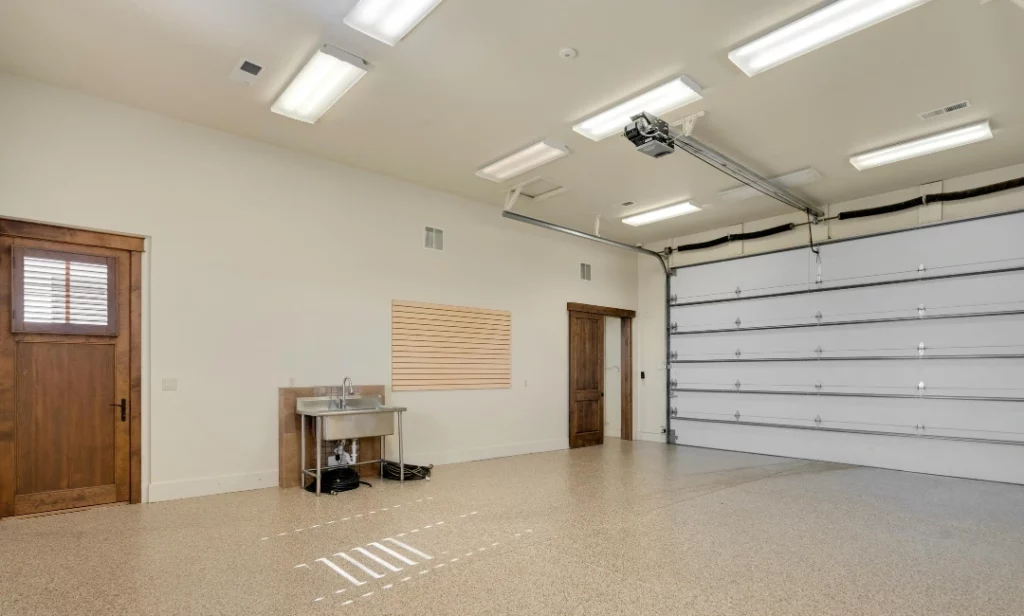
Maintaining epoxy garage flooring not only preserves its glossy finish but also extends its lifespan. With a few simple steps, you can keep your floor looking clean, durable, and resistant to wear. Epoxy floors are somewhat low maintenance once installed, yet here are some ideas to lengthen their life:
- To prevent scratches, dust, or sweep frequently.
- Quickly address chemical leaks or clean oil spills.
- For monthly deep cleaning, use a soft mop and mild cleaner.
- Stay clear of dragging metal tools or large equipment on the ground.
- Every few years, re-seal the topcoat for extra protection.
Epoxy floors can survive 10–20 years without peeling or fading if given correct maintenance.
You May Also Like: Want To Beat The Spike? See How Rising Gas Prices Impact You.
Conclusion
Epoxying a 2-car garage costs what? The solution depends on several variables, including the grade of your epoxy, the condition of your concrete, and whether you choose for DIY or professional setup. A superb, professionally installed finish will cost, on average, anything between $1,200 and $3,000.
Investing in epoxy flooring is a wise long-term move if you’re ready to turn your garage into a tidy, appealing, and sturdy area. And if you want trustworthy installation solutions, regional suppliers can help to lead you through the process.
Professionals specializing in garage floor renovations can be found near your location; some services let you easily compare prices and plan installation for those examining online possibilities.
FAQ’s
How long does it take epoxy to complete a 2-car garage?
Usually, two to four days include preparation, coating, and curing. This timeframe can vary depending on the humidity, temperature, and the number of epoxy layers applied.
Can Epoxy floors be slippery?
Yes, particularly when wet. For improved traction, you can use antislip granules or grit. These additives enhance surface grip, making it safer for both foot traffic and vehicles.
How long do epoxy floors hold up?
Properly maintained epoxy floors installed by professionals can survive 10 to 20 years. Their longevity depends on usage, maintenance routine, and exposure to chemicals or heavy equipment.

